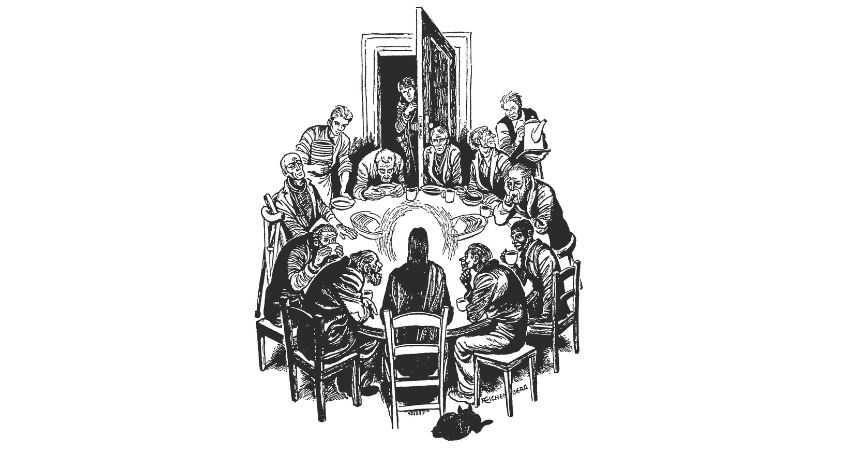“This man welcomes sinners and eats with them.”
BY LUKE HANSEN | September 12, 2022
Today’s Readings
You might want to think twice before inviting Jesus for a meal. He is never afraid to challenge his host and offer a demanding lesson.
One example is the Gospel story we heard two weeks ago. Jesus tells his dinner host, one of the leading Pharisees, not to invite friends or relatives or wealthy neighbors when hosting a banquet, but rather, “the poor, the crippled, the lame, the blind”—those who cannot repay (Luke 14:12-14).
In yesterday’s Gospel, we learn that Jesus practices what he preaches. The Pharisees and scribes complain about Jesus, saying, “This man welcomes sinners and eats with them” (Luke 15:2).

In the first century—as well as today—one’s company at meals and banquets says a lot about who we are and what we value most. Jesus repeatedly used table fellowship as a way to manifest God’s kin-dom: the wedding feast at Cana, the feeding of the multitudes, inviting himself to the house of Zacchaeus, receiving the anointing of a woman. In this way, Jesus embraced those who were considered sinners and outcasts and affirmed their belovedness in God’s eyes.
Who do we invite to our meals and banquets, and what does it say about us?
At the Jesuit high school where I teach and minister, every first-year student spends a half day at St. Anthony’s Foundation in San Francisco, a place that welcomes over 1,200 people for lunch each day. St. Anthony’s is intentional in saying they have a “dining room,” not a “soup kitchen,” and the people who come for lunch are honored “guests.” Our students dine with the guests and listen to their stories. In the end, it’s not about any “service” we provide, but the gift of each person we encounter. It is the Gospel.
Luke Hansen is a campus minister and religious studies teacher at St. Ignatius College Preparatory in San Francisco. He has worked extensively with prisoners as a teacher, minister, and advocate. A native of Wisconsin, Luke enjoys running, playing basketball, and cheering for his favorite sports teams.











There are two places that come to mind when I think about offering ‘the table’ to others. Wen I was physically teaching at a local University, I would always have the international students come home for Thanksgiving. It was good for them and good for our family to share a meal like that with others. Some even brought ethnic food to share.It was a good day to be thankful and to share our homeland stories. The second place happens every month at the gathering for Alpha, a program in which the relationship with God is strengthened. The meal provided by generous people from the Faith Hub and the parish is a time to talk about our faith. People are from all different parts of Chicago and share what God means to them in their everyday life. Last evening we talked about our being part of the new program starting this week and the joy of getting to know others who celebrate their faith with Mass and other actions that remind us of how God can be present in our lives. The people present are from all ages and economic background. They share how God is with them day in and day out and the support they feel from this group as they start a new week. We have the opportunity to bring the Holy Spirit to all the interactions that take place during the week. It is a program that has spread throughout the Archdiocese and assists others in knowing/loving/serving God.
Commensality and conviviality are vital little celebrations that go a long way in world-building.
How often do we go to church and there’s a beggar at the entrance.
Do we invite him into Church to share Jesus and then invite him home for a meal ?
Or even worse go to a restaurant after Mass to eat a meal with the priest and do not invite the beggar to join us?
Who really needs to be fed?
You are so right the beggar is the person that really needs to be fed. Sometimes when reflecting on a passage like this.in deep contemplation we realize that all need to be fed in a different way. The rich sometimes can’t identify their needs and reach for bigger material compensation while the poor long for spiritual nourishment and reach out to each other for their spiritual food.